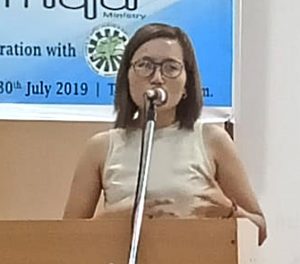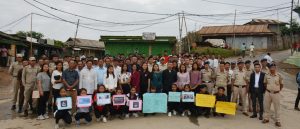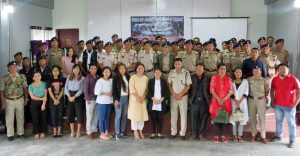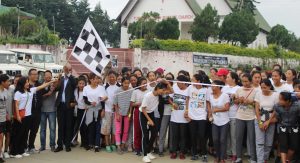Nagaland
‘Trafficking will come to us in some way or the other’
Eastern Mirror Desk
Dimapur, July 30: Community organisations and governmental and nongovernmental groups observed International Day against trafficking in persons with various programmes calling for stronger policy and advocacy measures to tackle human trafficking.
At a programme that was organised in Dimapur by Miqlat ministry and the Nagaland Baptist Church Council’s women’s department, the former general secretary of Asia Pacific Baptist Federation Rev. P Bonny Resu cautioned that human trafficking will happen to people in one 1way or the other.
“Just because it is not happening close to us does not mean it won’t happen to us,” Resu said at an event commemorating International Day against trafficking in persons, on July 30 at the Don Bosco Institute of Development and Leadership.
A local ministry Miqlat ministry and the Nagaland Baptist Church Council’s women’s department organised the event with the theme ‘stronger together.’ Individuals from different organisations both government and nongovernmental including apex community bodies attended the programme.
Resu, pointing to statistics of millions that are trafficked worldwide, said most of the victims are deceived, forced or compelled. Only one in 100 have a chance to escape, he said.
The church should be an instrument of rescue and abode that offers care when faced with the situation of dealing with survivors and victims of trafficking, the gathering was told.
A panel session on the topic of human trafficking in Nagaland was also conducted during the event. Speakers from different fields participated in the segment of the programme.
The moderator of the panel, Vitono Gugu Haralu reminded the gathering that the public needs to talk about social integration and the mindset of people need to change when it came to the topic of human trafficking.
“Human trafficking is so new in the society but it is rampant and present,” Haralu said.

Henlly Phom Odyuo, journalist from Eastern Mirror highlighted the difficulties that the media face when it comes to reporting social issues such as human trafficking.
“We need cooperation from the NGO’s and the police department when report needs to be published,” said Odyuo, who is also general secretary of the Dimapur Press Club. Whenever the police are approached for certain statistics and figures, it usually is not given out, the gathering was told.
“We need to understand and create awareness and the media can be used as a platform for that,” Odyuo said.
“Collaboration with each other to do away with such evils in society is important. Make proper use of the free space provided by the media.”
K Ela, director of nongovernmental welfare group Prodigals Home also addressed the event. The social activist said children, in the context of Nagaland, suffer especially when those working as domestic help.
“The reality speaks a different story in Nagaland where most perpetrators are from Christian homes,” Ela said. “We have bought children and we have sold children. This is the stark reality.”
Additional deputy commissioner (crime) of Dimapur police Relo T Aye also addressed the event. He felt that empowering the survivors and the victims is most important.
“We must encourage skill development and training for the victims and survivors of human trafficking in the state,” the police official said.
Aye informed that whenever an FIR is filed, it is not automatically registered as it goes through an enquiry stage, especially when it involves missing persons.
“We need to have the courage to admit that we also are at fault and blame. We should not justify,” Aye said.
Districts
District administrations and establishments in the districts also conducted similar programmes.
The government publicity agency, the department of Information and Public Relations (IPR) issued updates on Tuesday about the programmes.
In Kiphire, the district’s administration, district centre for women and Sakhi One-stop Centre organised a programme on World Day against trafficking in persons on July 30 at Deluxe point, in Kiphire town.

According to the IPR, extra assistant commissioner Wetsho Lasushe gave a short speech.
‘Human trafficking is a serious crime that exploits children, women and men for numerous purposes indulging in force labour and sex, ‘ he said. He mentioned that every country is affected by human trafficking.
‘It is so sad that our people our state is no exception. It is a business where women are compelled to provide commercial sex, steals the children and making their life miserable. Human traffickers come with deceitful schemes, Lasushe said.
‘Women, children and weaker sections of the society are the targeted and are ‘valuable.’ Parents, youths, students and society as a whole must be vigilant at all times to such deceitful agendas,’ the official said. He exhorted the citizens of Kiphire to cooperate and fight against trafficking.
Additional police superintendent of Kiphire, Sentilong, no surname given in the IPR report, also spoke at the event. The police officer highlighted that trafficking can be manifested in many ways including prostitution, child labour, domestic workers, begging, child marriage, illegal adoption and organ trade.
‘Anybody can be a victim to traffickers. So if these things happen in the locality, immediate complaints should be lodged at police stations or even in the district magistrate establishment, he said. He urged students and teenagers to be more aware about trafficking even in the days to come, the IPR stated.
The Kiphire National Cadet Crops also performed a street play themed on the World Day against trafficking. A talk about being aware of trafficking was given by Tsosing, a counsellor. She was stated to have called upon the students’ community to take action in the campus, or join or establish a club to raise awareness about human trafficking and initiate actions throughout the local community. Likewise, she urged them to work with local religious communities to stop trafficking. They can do so also by supporting service providers and educating the people, the IPR stated.
Church leaders, school students, members of nongovernmental organisations, and ward leaders, among others, attended the programme.
Mokokchung

Sakhi-One Stop Centre at Mokokchung and the Nagaland Police’s district executive force observed World Day against Trafficking in persons with the slogan “You can free me” at the new reserve DEF on July 30 in Mokokchung.
Y Tumchobemo Yanthan, additional police superintendent and nodal officer of Sakhi-OSC at Mokokchung gave the keynote address. He said the objective behind organizing the programme was to contribute to tackling the practice of human trafficking especially of women and children in Naga the society.
The police official added that to make people aware and to be resilient against the problem, people need to be educated to become advocates to stop human trafficking. This should be given importance, he said.
Wangshinaro Yaden, centre administrator of Sakhi-OSC and Moatemjen, a panel lawyer at the Mokokchung district legal services authority were the speakers at the event.
Yaden spoke on the topic ‘modern day slavery-Human trafficking. She said Nagaland is in a ‘crisscross highway of border areas’ where trafficking is prevalent. The average age of a victim of trafficking is 12 years old. About 80% of the victims are women and they are forced into prostitution or into pornography, she claimed.
Yaden said sex trafficking of boys is often hidden, reflecting cultural taboos. She asserted that only one percent of human trafficking victims are ever rescued, and the victims who are rescued often suffer mental trauma and physical abuse.
She was optimistic that the police personnel would be vigilant to curb human trafficking in the society.
Moatemjen spoke about “suppression of immoral traffic in women and children act 1956, immoral traffic prevention Amendment Bill 2006, Trafficking of Persons (Prevention, Protection and Rehabilitation) Bill 2018. He talked to the gathering about victim compensation, sexual exploitation, prostitution, forced marriage, labour exploitation and pornography, among other issues.
District police officers, police personnel, and church members of the DEF Mokokchung Baptist Church, among others, attended the programme.
(Our Correspondent)
Tuensang

The District Poshan Abhiyan organised a marathon for women in commemoration of World Day against trafficking in person, on July 30 at Tuensang. The marathon was themed “A marathon to free” (sic) in which hundreds of women both young and old participated, the IPR reported.
The deputy commissioner of Tuensang district, Mohammed Ali Shihab, was the special guest of the event. In his address, the administrator lauded the departmental officials for organising the programme which he said helps in educating the people about human trafficking.
‘The girl child education is very important for the change of the society. We have a short life and children are a blessing from God. So children who are free from mental and physical bondages are our duty,’ he told the gathering.
‘We are the goodwill ambassadors against human trafficking. So it should not just end with a marathon race but awareness should go beyond boundaries and every villages so that the general public will benefit from this campaign,’ the officer said.
Further, Shihab said human trafficking does not mean it is a big scale activity ‘but it starts from the kitchen chores and domestic works and forced labours.’
‘We should not silently witness those around us but play an active role to stop before it becomes a social menace,’ he told the gathering.
After the formal programme, the deputy commissioner flagged off the marathon which started from the TTBL church compound. The marathon’s finishing line was at the clock tower of Tuensang.
Kathi and Musem, no surnames given in the IPR report, secured the first and second place respectively while Hanji M was declared the third prize winner. The top-seven finishers were awarded with consolation prizes, the IPR stated.
Wokha
Wokha district also observed World Day against trafficking in person on the 30th at the DBHSS youth centre. The event was organized by the district administration in collaboration with Mahila Shakti Kendra (MSK) and Sakhi-One Stop Centre.
The theme speaker for the event was, Shanchobeni P Lotha, project assistant at the Wokha District Legal Services Authority. Addressing the gathering, she said the root causes of trafficking are poverty, lack of employment opportunities, low socio-economic status, lack of education and awareness. She appealed to the people to exerted concerted efforts to address the issue and fight trafficking.
Lotha emphasised on the intervention of central and state government initiatives such as protection homes for girls which provide custodial care, education, vocational training and rehabilitation, among others, the IPR stated.
The women welfare officer of the MSK, Dr Wonchano E Enny talked to the participants about the activities of the MSK under the girl child programme Beti Bachao Beti Padhao. She said that the MSK was a new scheme that was introduced to give support service and to empower rural women through skill development, and health and nutrition objectives.
Another advocate, Nancy, no surname given in the IPR said, said that the Sakhi-One stop Centre emphasises on providing integrated support and assistance under one roof to women affected by violence in private and public spaces. These areas could be within the family, community and at work place, or women facing physical, sexual, emotional and economic abuse irrespective of age, caste, educational status and religion.
Nancy informed the gathering that the centre provides counselling and legal assistance to fight against any form of violence against women, the IPR added.

